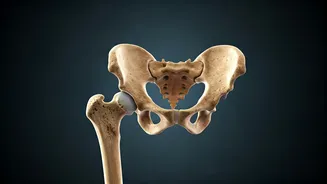Exercise's Crucial Role
Regular exercise is a cornerstone of robust bone health. Weight-bearing and strength-training exercises are particularly beneficial. These types of physical
activities place stress on the bones, prompting them to adapt and become denser. For weight-bearing exercises, think of activities such as walking, jogging, dancing, and stair climbing. Strength training involves using resistance, like free weights, weight machines, or even your own body weight. Aim for at least 30 minutes of moderate-intensity exercise most days of the week, with strength training exercises two or three times a week. This consistent physical activity not only strengthens bones but also improves balance and coordination, reducing the risk of falls and fractures.
Nutrition and Bone Health
Proper nutrition is vital for strong bones. Adequate intake of calcium and Vitamin D is fundamental. Calcium is a primary building block of bones, and Vitamin D helps the body absorb calcium. Dietary sources of calcium include dairy products, leafy green vegetables, and fortified foods. Aim for the recommended daily intake of calcium, which varies based on age and sex, typically around 1,000 to 1,300 milligrams per day. Vitamin D can be obtained from sunlight exposure, certain foods, and supplements. Including protein in your diet is also essential, as it supports bone formation and repair. Ensure you’re consuming enough protein-rich foods, such as lean meats, poultry, fish, beans, and lentils, to support bone strength.
Lifestyle Choices Matter
Certain lifestyle choices significantly impact bone health. Avoid or limit habits that can weaken bones. Smoking, for example, is linked to decreased bone density and a higher risk of fractures. Excessive alcohol consumption can also interfere with calcium absorption and bone formation. Maintaining a healthy weight is also important. Being underweight can lead to bone loss, while obesity can increase the risk of falls and fractures. Making these positive lifestyle changes can contribute to stronger bones and overall better health. It's about building a healthy foundation that supports your body throughout life, especially as you age.
Calcium Intake is Key
Ensuring adequate calcium intake is a fundamental aspect of bone health, with calcium being the primary building block for bone structure. The body constantly remodels bones, breaking down old bone and building new bone. Sufficient calcium intake is essential to support the building phase of this process. Focus on incorporating calcium-rich foods into your diet. Excellent sources include dairy products like milk, yogurt, and cheese. For those who are lactose intolerant or prefer non-dairy options, consider leafy green vegetables such as kale and spinach, fortified plant-based milk, and tofu that has been prepared with calcium. Consider calcium supplements if your dietary intake is not sufficient; however, it's best to consult a healthcare professional to determine the correct dosage.
Vitamin D Levels and Bones
Maintaining optimal Vitamin D levels is crucial for bone health because it plays a key role in calcium absorption. Vitamin D helps the body absorb calcium from the food you eat and the supplements you take. Without sufficient Vitamin D, even if you consume plenty of calcium, your body won't effectively absorb it, which can impair bone formation and increase the risk of bone loss. Obtain Vitamin D through safe sun exposure, dietary sources, and supplementation. Your skin produces Vitamin D when exposed to sunlight, but be cautious of excessive sun exposure. Dietary sources of Vitamin D include fatty fish, such as salmon and tuna, and fortified foods like milk and cereals. Consider taking a Vitamin D supplement, especially if you have limited sun exposure or a Vitamin D deficiency.




















